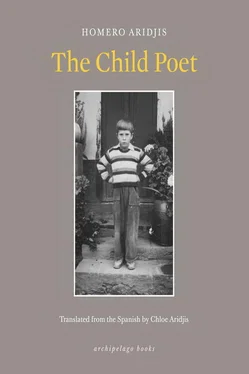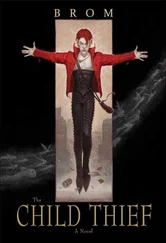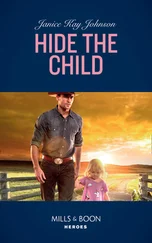Not far from us, amid the magueys, a few buzzards repeatedly swooped down to feed on a dead dog whose stench could be smelled from meters away, as if enclosed within a fetid circle. Black and solitary, like gloomy emissaries or birds from the beyond, they would peck at the dog.
Before, like a silent scream, the stench had summoned them, proclaiming the carcass through the air.
At dusk we started home, resuming our conversation about house building and new business ventures. If fruits were in season, we would return with baskets full of peaches and figs.
Once home, my brother would go off to play pool and we would remain in the garden. My father read the newspaper, my mother watered the plants, and I sat on a step and watched my parents, sensing an indefinable sadness in them that made me sad too, as if it were in the very air, in the hour, in ourselves, in the funereal nightfall.
One morning they attacked the rummage room, a jungle of objects that seemed to defend its clutter. The maids would pull out tricycles with missing pedals, deflated balls in whose rubber a residual red still lingered, a token of bygone days; sparse brooms, chipped mirrors, wobbly tables, chairs without backs; clothes wistful for the shapes of my mother and father in irretrievable years; benches whitened by pigeons.
Dust rose from corners, walls, and things, as if secreted from the hollows, folds, and hours.
Then, once the floor was swept, the shelves dusted, the shared past of the house set here and there, so that a coat belonging to my father when he first arrived in Mexico in 1927 was brought blindly face-to-face in the present with a sweater worn by my mother a few years ago (the two made contemporaries only through finding themselves in the same derelict room), the things went back to the wardrobes, not to be restored to everyday life but to gather dust all over again, cloistered in a future of disuse. Preserved as tangible survivals of our own selves, perhaps to remind us of the unreality of our bodies and our ages, the shifts in our fancies and the ghostliness of our days in a torn shoe or in a record that was like the song to our games. Or to bear witness in the different-sized trousers and the variety of shirts we had worn to the growth of our bodies and the transformation of our faces, forever linked to certain overcast afternoons or to certain desolate days on which we could cry, or did cry, prey to a nostalgia so general or to a solitude so physical, we felt ourselves forgotten by everyone.
Like the time I walked, in a certain pair of trousers, to the railway station to wait for my brother, who was arriving from Mexico City, without asking my father for money to take the bus; and once the train arrived and my brother had alighted, I didn’t dare approach him and headed home without his knowing I had been there. Until on the way, when the bus driver told him I was returning to the village on foot, he made the vehicle stop and got off to help me on, asking why I hadn’t come up to say hello, and I, without knowing what to answer, had remained silent and cried.
There were wandering dogs in the village, scrawny, dirty, and hungry. They would attach themselves to the first person who walked by, and for a while had an owner, until a door closed in their face and they’d go back to being no one’s dog. They’d forage among scraps, prowling around houses or roaming the hot streets, their shadows nearly vaporized.
They barked their way through the night hours, when the sky is full of silences, distances, and stellar solitudes, and every noise reaches us with a din of urgency and abandonment, and voices from the street sound as if something terrible were happening.
I couldn’t imagine where so many dogs had come from, and why they didn’t have an owner. Many of them would gather in front of the butchers’ stalls at the market, monitoring purchases, watching the cutting up of carcasses, staring at the bloody cows hanging from hooks, licking the blood from the floor, and fighting over skins and bones. Sometimes, though, the butchers would subject them to butcher humor, tying strings of empty cans to their tails and lighting firecrackers that’d go off in a blast, and the howling dogs would take flight, the cans clattering against the cobblestones, pursued by the noise of their own making. They’d run past me, terrified, and if they managed to get into a house, they’d seek refuge under a bed or table, trembling violently, as if they were about to explode.
The dogs were the color of the sun, of a yellow that seemed sprouted from the fields. You could see them from the train, running over the plain alongside the cars, until, exhausted, they’d fall behind.
In the dog days some caught rabies and a policeman or a butcher would kill them with a bullet or a blow of the machete.
Around that time my brother used to buy pocketknives at a shop, selling them on credit to Ricardo el Negro, who then sold them on credit to his friends; but since no one paid Ricardo el Negro, he never paid my brother back either. My brother then embarked on a trade in wallets, which he bought at a shop and sold on credit to Ricardo el Negro, who sold them on credit to his friends; but since no one paid Ricardo el Negro back, he didn’t pay my brother. My brother then embarked on a trade in pocket diaries …
Around that time someone lent my brother a shotgun and he would go hunting with Ricardo el Negro; although they fired many shells they didn’t kill so much as a hare. They spent more time carrying the shotgun here and there than standing in wait for the animal they were after. We’d see them heading for the hill early in the morning, or in the afternoons sitting and smoking in the shade of an ash tree on the edge of the village, or at the playing field, clutching the shotgun, watching a soccer match. Until one evening my brother, tired of carrying it around, propped it against a wall in his room and left it there, forgotten, for months.
One afternoon as we played soccer, the ball, kicked hard, hit me in the face, and Arturo, who was also playing, began to laugh.
With half my face smarting, the burn of the leather on my cheek and dirt in my mouth, I went for him to wipe off his laughter and avenge my pain, but he merely pointed at my face and made a joke for the others, insulting me.
Then I motioned to indicate that he should prepare to fight. He moved away from the rest of them and rushed at me, his long arms and hard fists pummeling my head.
Hurt and humiliated because he was hitting me on the head, I went at him, pursuing him as he retreated, throwing punches to his face and belly until I knocked him to the ground.
Then, his nose bloody and his head cradled in his arms as if to hide or feign sleep, he cried out, in tears:
“No more.”
My hands were damp with his blood and dirt was stuck to them. My friends laughed and discussed the blows, mentioning a hard elbow in his ribs which I didn’t remember giving. I still had the feel of the fight on my hands, and the taste of his face.
There he lay on the ground, his eyes open, staring at me as if taking me in, while the others tried to help him up but he refused, so they left.
My friends and I then headed back, playing with the ball as we did.
He stayed behind, in the dark field.
I remember him the morning I came to his house when he left me waiting in the dining room while he went to the kitchen for a glass of water. As I sat there studying the calendars on the walls, his grandmother arrived, hobbling in on her cane, a very small woman, shrunken by age; and she took me by the arm, pleased to see me, and called me by a name I couldn’t catch … Until she realized I wasn’t the person she thought I was, and she asked whether I wasn’t so-and-so (another name I failed to catch) … but on seeing that I wasn’t that person either, someone she knew, she began reciting in a low, choked voice a list of names among which, she thought, would be mine. Until I told her I was a friend of Arturo’s and this was my first time in the house, repeating the words to her several times, which seemed to amuse her, and she left the room with the expression of someone who has already forgotten what was said to her and the person to whom she was speaking … Later, when Arturo and I came across her standing in the door to her room, she looked at me with curiosity (or rather, ignorance), as if trying to figure out who I was and match my face to some memory or name. But we went away before she relapsed, leaving her sitting in a chair, her gaze fixed on the open door.
Читать дальше












